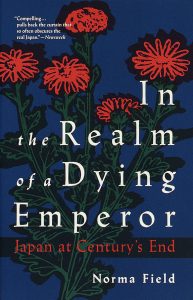In the Realm of a Dying Emperor
Women’s History Month is barreling toward us and I am happily working on bringing you another March full of mini-interviews with people who are doing interesting work in women’s history. In the meantime, I’m sharing some of the books that I’ve rediscovered in the process of finding room on my office shelves for the books I used in writing The Dragon From Chicago. (The danger with this is the temptation to re-read the books as I go. Which wouldn’t be a problem if it weren’t for all the as yet unread books piled throughout my office.)
Next up, In the Realm of a Dying Emperor: Japan at Century’s End by East Asia scholar Norma Field
Long, long ago, when I was a graduate student, I team-taught three sections of a four-section continuing education course called “Asia and the Middle East” for the University of Chicago. I covered South Asia, the Middle East, and occasionally South East Asia. My co-teacher, Robert LaFleur, a brilliant and creative scholar who combines anthropology and history in his study of Chinese history and culture, covered China, Japan, and occasionally Korea. Over the course of the five years that we taught the course, I read everything he assigned—a fascinating dive into cultures and history that I knew little about that was the rough equivalent of an undergraduate major in East Asian studies. (Minus term papers, exams, and language requirements.)
In the Realm of a Dying Emperor, published in 1991, was one of those books. It was, by intention, a solid kick in the cultural assumptions. Emperor Hirohito had died in 1989. Norma Field, the daughter of an American soldier and a Japanese woman, was in Japan in the year leading up to his death. She witnessed the nation’s vigil over the dying emperor and its uncritical, formalized exaltation of his life after his death. In In The Realm of a Dying Emperor, Field sets that exaltation and the “national amnesia” which made it possible against the stories of three Japanese who dissented against the cultural hegemony that dictated the response to the emperor’s death in the prior two years. An Okinawan supermarket owner burned the Japanese flag in protest against Japan’s treatment of Okinawans. A widow sued the state to prevent the Shinto deification of her husband, a member of the Self-Defense Force who died while officially on duty, though not on the battlefield, claiming that it was an infringement of her religious rights as practicing Christian. The mayor of Nagasaki, also a Japanese Christian, raised a furor, and exposed himself to death threats, by stating that the emperor bore some responsibility for Japan’s role in World War II and consequently for the nuclear attacks on Hiroshima and Nagasaki.
Field does not simply tell their stories, she examines the public response to their actions and the roots of their actions in their minority status. She interweaves their stories with her own experience as “one of them war babies” growing up in Japan in the 1950s.
My memory of the book is that it was a compelling account of a society with fractures it did not acknowledge. If you’ve read it, I’d love to hear what you thought.





